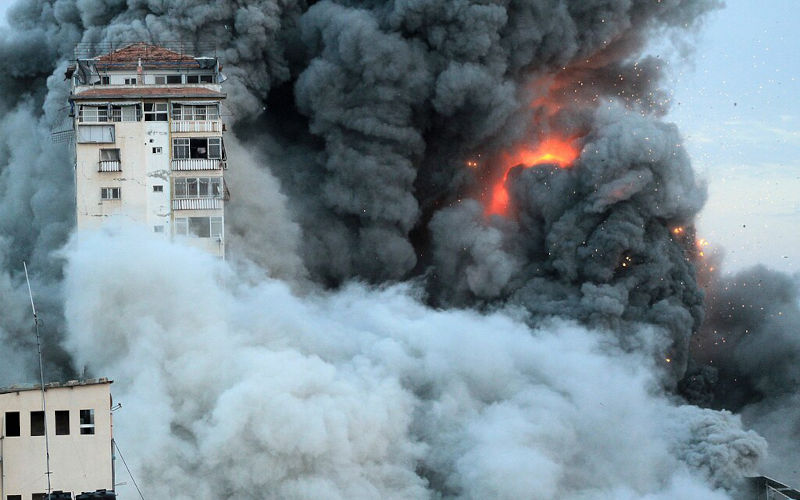Counting the environmental toll of war – and why peace is a climate solution
June 22, 2024
One’s immediate thought on looking at any of the multitude of photos of the devastation of Gaza is a profound sense of sorrow and grief at the capacity of humans to wreak such destruction and suffering.
There is mind-numbing despair at the plight of children who have lost everything – their parents, other family members, their own health, their education, their fun, their society, their future.
As catastrophic as this is, it is not even the full picture of the harm being wrought in the destruction of Gaza.
One can’t help wondering also: when rebuilding eventually starts, where will whole neighbourhoods of rubble go?
It will need new neighbourhoods of rubble simply to hold it all, or that very useful waste dump – the ocean. Moving it all and starting again will be part of a hidden problem in the war on Gaza – its greenhouse gas emissions.
The carbon costs of war and its preparations are of increasing concern to civil society, as rapid greenhouse gas emissions reductions become increasingly urgent.
Military emissions
The Conflict and Environment Observatory (CEOBS) estimates that the world’s militaries may be responsible for 5.5 percent of global emissions, “a proportion so great that it can no longer be ignored”.
A study released on 6 June from Queen Mary University of London (QMUL), “ A Multitemporal Snapshot of Greenhouse Gas Emissions from the Israel-Gaza Conflict,” examined the emissions from three phases of the current war on Gaza.
The immediate emissions – from bombing raids, reconnaissance flights, rocket attacks etc – in the four months from October 2023 to February 2024 were estimated to be greater than the annual emissions from 26 individual countries and territories.
The emissions total increased dramatically when those from the construction and fortification of war infrastructure, such as the Hamas tunnel network and Israel’s ‘Iron Wall’, and from rebuilding Gaza, were included.
Despite the significant contribution of military emissions globally to the climate crisis – quite apart from the huge distraction of resources and attention from the climate crisis that conflicts provide – there is much work to be done in getting the issue on national and international agendas.
Although the COP28 meeting in Dubai in December 2023 recognised in its Declaration on Climate, Relief, Recovery and Peace the lack of climate resilience in countries affected by armed conflict, it failed to address the underlying problem of armed conflict itself.
Recognising this gap, an article in the BMJ on 19 January this year, “ Disarmament is vital for climate justice and health” called for “collaborative, intergenerational action to raise public awareness on demilitarisation for climate justice and health.”
Civil society organisations at COP28 advocated for this, recognising also that with global military spending in 2023 estimated to be at least US$2.4 trillion, demilitarisation could go an extremely long way to funding climate mitigation and adaptation.
CEOBS’ account of the COP28 meeting, “ Always Money for War”, reminded us also of the inequitable fact that military emissions are exempt from mandatory reporting under the UN Framework Convention on Climate Change (UNFCCC), following US lobbying at COP3 in 1997. Because such reporting is voluntary, most nations choose not to do it.
Mandatory reporting needed
The Medical Association for Prevention of War (Australia) has reported on the opacity surrounding Australia’s military emissions, finding that the Australian Defence Force (ADF) has not published complete energy use or emissions data since 2012.
In the years for which data has been made public, the ADF was responsible for 66 percent of the Australian Government’s emissions.
As stated by the authors of the recent QMUL study, there is “an urgent need for mandatory military emissions reporting through the UN Framework Convention on Climate Change to better understand and mitigate the climate impact of conflicts.”
Advocacy from the climate health movement, and the health professions generally, about this need would be valuable.
As we strive for rapid emissions reductions across the board it makes no sense to ignore a sector that contributes significantly to the climate crisis and yet escapes accountability for its role. At the very least, we need far greater transparency and mandatory reporting of military emissions.
But we need more than mandatory reporting, which will just tell us how big the problem is.
We need action in the form of demilitarisation – for the people of Gaza, Israel, Sudan, Ukraine and many other places, and for the climate that is so critical to the health of all of us.
Event
On Wednesday, 17 July an expert panel will be convened, in real life and via livestream, by the Network of Women in Emergency Medicine (NoWEM), teaming with Women in Intensive Care (WIN), and joining Dr Natalie Thurtle in Melbourne, broadcasting her controversially cancelled talk which referenced working as the medical coordinator for MSF in Palestine. The panel will address how healthcare providers and organisations can and must be able to speak in an unprecedented and tense political climate, without harming and cancelling each other. This discussion will build on the previous event held in Sydney.
The panel moderated by Dr Ruth Mitchell, neurosurgeon and Nobel Peace Prize recipient, includes Dr Natalie Thurtle, previous medical coordinator for MSF in Palestine; Mary Freer, CEO Compassion Revolution; Dr Sarah Abdo, physician and activist; Dr Kristin Boyle, emergency physician; others TBC.
Register here.
Republished from CROAKEY HEALTH MEDIA, June 20, 2024

